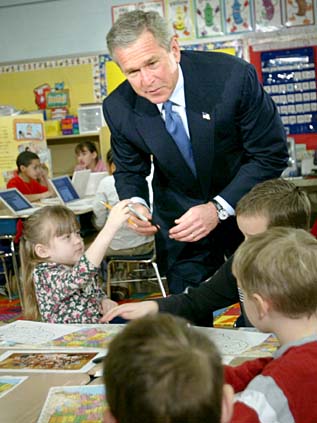
ASSOCIATED PRESS
President Bush visited with students yesterday at West View Elementary School in Knoxville, Tenn. Bush was in town to mark the second anniversary of the No Child Left Behind Act.
Feds say states not
spending ed fundsEducation officials counter
that various federal rules make
the money hard to claim
WASHINGTON >> The Bush administration, roundly criticized by states over its funding of education, is countering that the states are sitting on billions of federal dollars meant for schools.
The White House and Education Department officials charged yesterday that the 50 states, the District of Columbia and eight territories have $5.75 billion in unused federal money from 2000 to 2002. That amounts to 8 percent of the $71.6 billion set aside for six programs during that time, including help for disabled students and high-poverty schools.
"The states will say, 'We'll ask for that money as we need it,'" said Eugene Hickok, acting deputy secretary of education. "Well, one has to ask, If they're that tightly strung out with regard to federal dollars to make No Child Left Behind work, then why haven't they accessed the dollars they have?"
Hickok referred to the 2002 law that aims to ensure every child can read and do math at grade level within the next 10 years. It was led by President Bush, who marked the law's two-year anniversary yesterday by meeting with schoolchildren in Knoxville, Tenn., where he pledged to ask for an extra $2 billion for special education and low-income aid.
The law places broad mandates on states, including highly qualified teachers in all core classes, expanded standardized testing and data collection, and reporting on how students perform by race, ethnicity and other groups.
A range of critics, from Democratic presidential contenders to teachers unions, say the law is enormously underfunded despite steady increases in federal spending. The countercharge of unspent money has emerged as a new defense by the Republican leaders, frustrated that the dollar debate has overshadowed efforts by schools to raise achievement.
"The truth is, the federal government has been increasing education spending more quickly than states can spend it," said Rep. John Boehner, R-Ohio, chairman of the House Education Committee.
The data listed Hawaii as having failed to spend $45 million, or 12 percent of the money allotted. Greg Knudsen, spokesman for the Hawaii Department of Education, reached late yesterday, said the amount sounds way off.
"There's no way we would leave that much money unspent," he said. "That just doesn't sound right. Our goal is to totally deplete all federal funds. We monitor that and we're quite conscious of that."
Education officials representing the states also said the claim is misleading.
"It's very simplistic to say there's money in the pipeline that wasn't spent," said David Shreve, senior committee director for education at the National Conference of State Legislatures. "And it avoids the issue of whether No Child Left Behind is putting mandates on the states that aren't paid for -- that's the bottom line."
A number of reasons explain why states may not have drawn down their money, said Shreve and Jordan Cross, manager of federal-state relations for the Council of Chief State School Officers.
Among them: States have 27 months to spend the money once it has been released by federal officials; Congress is often months late in passing its budget each year, causing states to reserve some money until the picture becomes clear; states have, in many cases, earmarked the money to be spent; and rules on spending federal money are often confusing and restrictive.
The $5.75 billion in unspent money also encompasses funding that has nothing to do with the new education law, including money for adult education, Shreve said. Plus, the total is a tiny fraction of the more than $450 billion the nation spends on education, he said.
Two Democrats who helped secure bipartisan support for the law, Sen. Edward Kennedy of Massachusetts and Rep. George Miller of California, accused the administration of false claims and broken promises.
"Schools across the country are being forced to lay off teachers, eliminate after-school activities and reduce school hours because of drastic budget shortfalls," the two lawmakers said in a statement. "Meanwhile, the administration is using accounting gimmicks to claim that $6 billion in unused federal education funds are waiting to be used."
Yet Hickok said some state officials are trying to have it both ways, asking for more without spending what they have.
Star-Bulletin reporter Susan Essoyan contributed to this report.
